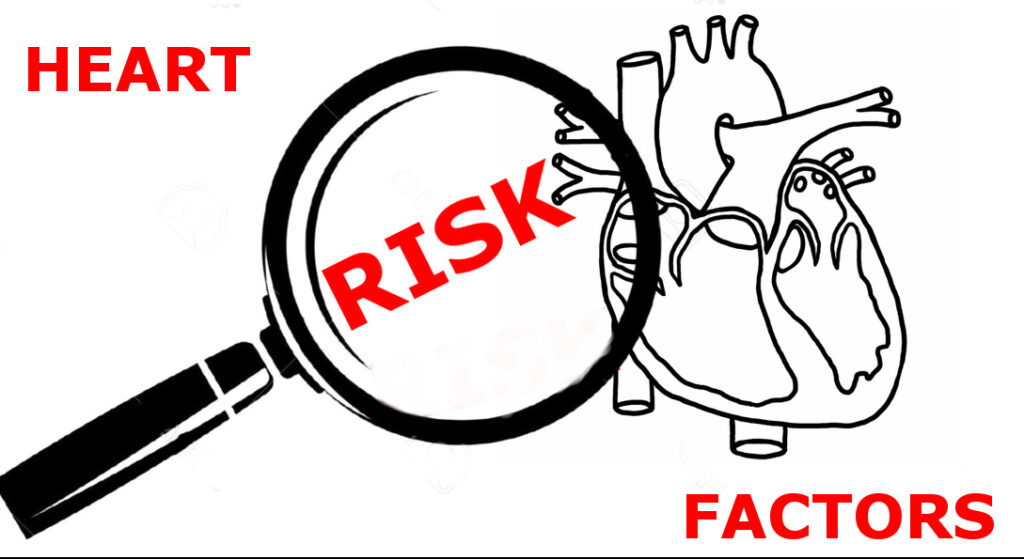Heart Disease Risk Factors
The Quiet Danger: Recognising Heart Disease Risk Factors
Heart disease has a lengthy history and is the world’s biggest cause of death. Numerous heart disease risk factors are under your control, despite the fact that they may appear unavoidable. You may greatly lower your risk and safeguard the health of your heart by being aware of these risks and taking preventative action.
Table of Contents

Modifiable Risk Factors: Managing Your Well-Being
Heart Disease Risk Factors
You can affect these risk factors by altering your lifestyle and receiving medical attention:
- Smoking: Smoking causes inflammation all over the body and destroys blood vessels. Your risk of a heart attack, stroke, and other vascular illnesses is greatly increased. The single most crucial thing you can do for the health of your heart is to stop smoking.
- Hypertension: If left unchecked, hypertension makes your heart work harder to pump blood throughout your body. This strain increases the risk of heart attack, stroke, and heart failure over time by weakening the heart and damaging blood vessels. It is essential to maintain a healthy blood pressure by dietary changes and, if necessary, medication.
- Elevated Cholesterol: A fatty material present in blood is called cholesterol. Elevations in low-density lipoprotein (“bad”) cholesterol may be linked to the accumulation of plaque in arteries, causing them to constrict and obstructing heart-lung circulation. On the other hand, HDL (“good”) cholesterol aids in the artery-cleaning action of LDL cholesterol. It’s critical to control cholesterol levels with medicine, exercise, and a nutritious diet.
- Diabetes: This long-term illness interferes with your body’s capacity to control blood sugar levels. Elevated blood sugar levels can harm blood vessels and nerves over time, raising the risk of heart disease, stroke, and other health issues. It’s critical to control diabetes with food, exercise, and medicine.
- Obesity: Being overweight strains the heart and raises the risk of various illnesses like diabetes, high blood pressure, and sleep apnea, all of which are linked to heart disease. The secret is to keep your weight in check with a balanced diet and frequent exercise.
- Living a Sedentary Lifestyle: Lack of exercise damages your heart and blood vessels. To strengthen your heart, try to get in at least 150 minutes of moderate-intensity or 75 minutes of vigorous-intensity activity per week.
Non-Modifiable Risk Factors: It’s Important to Know
Heart Disease Risk Factors
Although there is no way to modify these risk factors, being aware of them enables early detection and intervention:
- Family History: You run a higher risk if you have a close family who has heart disease. See your doctor about further screenings and preventive actions if heart disease runs in your family.
- Age: As people age, their risk of heart disease rises. Your arteries naturally get less flexible with age, making plaque accumulation more likely.
Taking Initiative for Heart Health
Heart Disease Risk Factors
Step one is to understand your risk factors. What you can do is as follows:
- Plan routine examinations: See your physician for routine examinations to keep an eye on your blood pressure, cholesterol, blood sugar, and general heart health.
- Create a healthy lifestyle by eating a diet high in fruits: vegetables, whole grains, lean protein, and heart-healthy fats. Reduce your intake of added sugars, cholesterol, trans and saturated fats, and sodium.
- Keep a healthy weight: If you are obese or overweight, consult your doctor to create a strategy for safe and long-term weight loss.
- Control your stress: Prolonged stress can lead to bad habits and elevated blood pressure. Use stress-relieving methods such as yoga, meditation, and deep breathing.
- Never disregard symptoms: Be mindful of any heart disease signs, such as exhaustion, shortness of breath, and chest pain, and get help right away if you encounter any worrisome symptoms.
You may greatly lower your risk of heart disease and live a longer, healthier life by taking care of these risk factors. Recall that leading a healthy lifestyle is an investment in your wellbeing in the future. Discuss your unique risk factors with your physician to develop a customised strategy for maintaining heart health.


